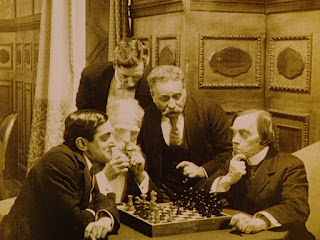This is not Ernst Lubitsch’s first film but it is his earliest-surviving long feature consisting of two reels and possibly a little more in the original version. It has something of the manic energy of his early comedies without perhaps the editorial control: as if he was in a rush and over-improvising. There’s no Pola Negri making like a cat or Ossi Oswalda not wanting to be a man but here we have Ernst himself not wanting to be alive… well, sort of.
Writer and Director introduces himself as a performer by
stepping through the curtains in a nod to theatrical tradition. He grins at the
camera and is a figure of impish vitality – it is good to see and whilst I’ve
seen Ernst act in Sumurun here he is
more himself in an attempt to be a dramatic comedy lead (not successfully as he
later admitted).
  |
| Lanchen Voss and Louise Schenrich |
He is followed on the cine-stage by Louise Schenrich who
will play his wife and then the formidable form of Lanchen Voss who is his
mother-in-law: Schwiegermutter in German which sounds far more of an insult.
Als Ich Tot War
(When I Was Dead) was originally
released as Wo Ist Mein Schatz? (Where's My Sweetie-Pie? or Treasure?) after the censors objected to
the original title… there was a war on I suppose. It is a film about marital
misunderstandings, chess obsessives and the transformative properties of the
right kind of toupee.
But, more than anything, it is about the dangers of
living with your mother-in-law… a timeless source of humorous friction: had Les
Dawson been alive then or now, this is the kind of silent film had have made.
 |
| Happy families |
Ernst lives with his lovely wife Louise and her
over-bearing mutter, he has a passion for chess and after being invited to the
local chess club for a match stays out far later than his Schwiegermutter would
like. Ernst is frustrated by the slowest moving opponent you can imagine and
chews hard on his cigar as he glances at the audience in frustration.
By the time his bland master opponent has moved enough to
be defeated, his mother in law has locked him out of their apartment and, as he
sleeps in the hall she evens steals his clothes for good measure – what a mean
old Mam?!
 |
| Slow moving |
An argument ensues the following morning and tensions run
so high that his Louise has been persuaded to write him a note asking for a
divorce: it seems that he may have won the match only to lose out in matrimony!
Ernst won’t take this lying down and writes a note back
threatening to take his own life – when under pressure it’s always a good idea
to sacrifice a pawn if it means you gain the Queen.
  |
| A mean ol' Mam |
Mother-in-law wastes no time in going to a marriage
bureau and asking what they have in stock. She is offered a middle aged man (Julius
Falkenstein) who recoils at the possibility that she might be his match.
Meanwhile Ernst has been boring himself silly by enjoying
life on the town… it’s not fulfilling and he wants his wife and life back. A
job advert offers him a way, as Mother-in-Law advertises for an “intelligent
younger man” to help around the house. With the aid of a cunning blonde wig,
Ernst is becomes a different man and even his own wife doesn’t recognise him…
see Mr Kent those glasses and Mr Wayne, that cowl… completely unnecessary!
  |
| Completely transformed! |
The new houseman is a wow with the other servants and his
employer begins to fall for his convincingly coiffured charms… but can Ernst
prevent his wife being won away by the “new” man from the agency and thereby
prevent his Schwiegermutter’s ultimate victory?!
It’s fluffy stuff but still funny and the three leads all
play well with Ernst’s over-familiar nods and winks to us almost a
statement of intent from the great director he was to become… “this is me
messing about but just you wait a few years!” Deeply un-historical I know, but
this man has the look of someone who really knows what he’s going to do!
  |
| The old and the young get ready... |
The film was regarded as lost until the 1990s when an
almost-complete copy was found in the Slovenska Kinoteka – it appears to be
missing part of the first act and maybe even the ending although maybe Lubitsch
trusted his audience enough to know how completely all would be resolved.
 |
| Three's a crowd |
It is now available as part of the Masters of Cinema dual
disc edition of Madame Du Barry
(1919) – which is a vast upgrade on the version of that film I’ve previously watched. It is available direct or from Amazon – a must-have
for those who appreciate the importance of being Ernst!
It comes with a zippy new score from Aljoscha Zimmermann
played on clavier and violin and which suits you very well Herr Lubitsch!



+colour.png)









No comments:
Post a Comment